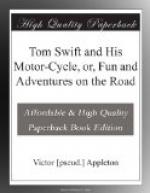He approached closer to Tom, and looked quickly up and down the road. The highway was deserted, nor was there any likelihood that any one would come along. Tom was somewhat apprehensive, for the tramp was a burly specimen. The young inventor, however, was not so much alarmed at the prospect of a personal encounter, as that he feared he might be robbed, not only of his money, but the valuable papers and model he carried. Even if the tramp was content with taking his money, it would mean that Tom would have to go back home for more, and so postpone his trip.
So it was with no little alarm that he watched the ragged man coming nearer to him. Then a bright idea came into Tom’s head. He quickly shifted his position so that he brought the heavy motor-cycle between the man and himself. He resolved, if the tramp showed a disposition to attack him, to push the machine over on him, and this would give Tom a chance to attack the thief to better advantage. However, the “hobo” showed no evidence of wanting to resort to highwayman methods. He paused a short distance from the machine, and said admiringly:
“Dat’s a pretty shebang youse has.”
“Yes, it’s very fair,” admitted Tom, who was not yet breathing easily.
“Kin youse go far on it?”
“Two hundred miles a day, easily.”
“Fer cats’ sake! An’ I can’t make dat ridin’ on de blind baggage; but dat’s ‘cause I gits put off so much. But say, is youse goin’ to let me have dat quarter? I need it, honest I do. I ain’t had nuttin’ t’ eat in two days.”
The man’s tone was whining. Surely he seemed like a genuine tramp, and Tom felt a little sorry for him. Besides, he felt that he owed him something for the unceremonious manner in which he had knocked the fellow down. Tom reached his hand in his pocket for some change, taking care to keep the machine between himself and the tramp.
“Are youse goin’ far on dat rig-a-ma-jig?” went on the man as he looked carefully over the motor-cycle.
“To Albany,” answered Tom, and the moment the words were out of his mouth he wished he could recall them. All his suspicions regarding the tramp came back to him. But the ragged chap appeared to attach no significance to them.
“Albany? Dat’s in Jersey, ain’t it?” he asked.
“No, it’s in New York,” replied Tom, and then, to change the subject, he pulled out a half-dollar and handed it to the man. As he did so Tom noticed that the tramp had tattooed on the little finger of his left hand a blue ring.
“Dat’s de stuff! Youse is a reg’lar millionaire, youse is!” exclaimed the tramp, and his manner seemed in earnest. “I’ll remember youse, I will. What’s your name, anyhow, cully?”
“Tom Swift,” replied our hero, and again he wished he had not told. This time he was sure the tramp started and glanced at him quickly, but perhaps it was only his imagination.
“Tom Swift,” repeated the man musingly, and his tones were different from the whining ones in which he had asked for money. Then, as if recollecting the part he was playing, he added: “I s’pose dey calls youse dat because youse rides so quick on dat machine. But I’m certainly obliged to youse—Tom Swift, an’ I hopes youse gits t’ Albany, in Jersey, in good time.”




